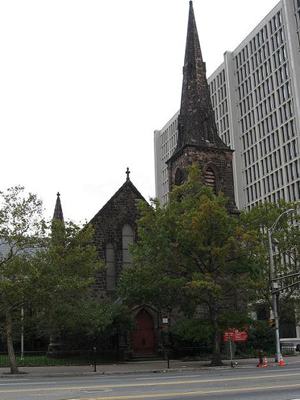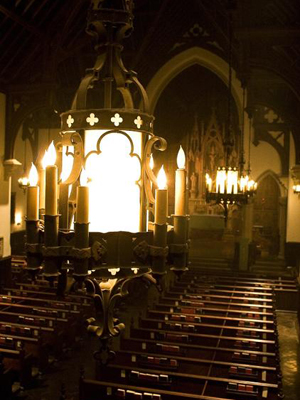| |
 |
 |
 |
| Comment on this report, or find other reports. |
 |
| Our Mystery Worshippers are volunteers who warm church pews for us around the world. If you'd like to become a Mystery Worshipper, start here. |
 |
| Find out how to reproduce this report in your church magazine or website. |
|
|
| 1628: Grace
Church, Newark, New Jersey, USA |
 |

Photo: Jeffrey Bennett |
 |
Mystery Worshipper:
Brother Juniper.
The church:
Grace
Church, Newark, New Jersey, USA.
Denomination:
The Episcopal Church, Diocese
of Newark.
The building:
The exterior, designed in 1848 by the English-born American
gothic revivalist Richard Upjohn, is dark stone, very typical
of the architecture of churches from the period and place. The
interior is most impressive – dignified and very tasteful.
There are various clearly Catholic touches, such as Marian paintings,
the stations of the cross, well executed statues of saints,
and a lovely side altar where the Sacrament is reserved in a
tabernacle. Yet it remains within the bounds of elegant Anglican
restraint – there are none of the somewhat precious "overly
Roman" touches which sometimes place Anglican Catholic churches
a bit over the top. The stained glass windows portray delicate
scenes from the scriptures, and there is an impressive stone
depiction of the crucifixion behind the main altar, flanked
by statues of Mary and of Christ the King.
The church:
I have had no previous contact with anyone from the church,
and the leaflet did not show any particular details which would
tell me what they contribute to the community in areas other
than worship. However, they clearly remain faithful to the initial
goal, as set forth on their website, "to be the standard-bearer
for Anglo-Catholicism in northern New Jersey." Their liturgical
practices show a definite dedication to a high standard of common
worship.
The neighborhood:
Newark is an odd combination in that, whereas most residents
are poor to working class, the downtown area contains a number
of large businesses, a new performing arts center, and many
social service, governmental, and law enforcement agencies.
The church is directly across from the federal building. There
are several large apartment buildings nearby, but overall this
section is not primarily a residential area. The imposing agency
structures are interspersed with many small businesses.
The cast:
The Revd J. Carr Holland III, rector, was celebrant and homilist,
and a priest who introduced himself as Father Brewer served
as deacon. Joseph Arndt, director of music, led a small choir
and cantor, all of high quality, in the choral and solo pieces.
The date & time:
160th anniversary of the dedication of Grace Church, Sunday,
October 5, 2008, 10.00am.
What was the name of the service?
Sung Mass.
How full was the building?
About 30 people were in attendance for the service, filling
the church to perhaps 25 percent of capacity.
Did anyone welcome you personally?
There were several elements of being welcomed which I did appreciate.
Earlier in the week, I had sent an email to the parish's address,
asking for information about weekday services. I was impressed
that the rector, who had been delayed a few days in responding,
assured me in his email to me that this had been because of
schedule overflow, not a lack of caring. I was greeted by an
usher as I entered the church. As I returned from communion,
I further appreciated that this same usher, when she apparently
noticed that I was suffering pain from my arthritis, took hold
of my arm. At the coffee hour, a church warden greeted me and
introduced me to several others present.
Was your pew comfortable?
Yes – standard, with ample kneeling pads.
How would you describe the pre-service
atmosphere?
The organist and choir were rehearsing when I first entered
the church, and there was an organ prelude (Olivier Messiaen's
Apparition de l'église éternelle) directly before the
service. I was pleased to see that the congregation were quietly
at prayer as they entered, displaying a very reverent devotion.
What were the exact opening
words of the service?
"Let us go forth in peace, in the name of Christ, Amen." The
service began with a procession from the chancel through the
entire church, consisting of crucifer, an acolyte, lector, deacon
and celebrant. The clergy wore gold brocade vestments, the others
cassock-albs.
What books did the congregation
use during the service?
The Hymnal 1982, plus a very thorough printed leaflet
containing the text of the service and music for the chants.
What musical instruments
were played?
Organ. The standard of music was notably high, particularly
since the choir consisted of only a few voices. The organist
was excellent, as was the cantor.

Photo: Eric Koppel
Did anything distract you?
There were two distractions. During the first reading, the lector
used vocal emphasis and gestures that reminded me of televangelists
or a story-teller, and this seemed at odds with the highly dignified
manner of the service. The other was that, again in strong contrast
to the general tone, the exchanging of the peace was an exercise
in walking all about the church to say hello to everyone present.
Was the worship stiff-upper-lip,
happy clappy, or what?
Impeccable Anglo-Catholic, a Rite II sung mass celebrated at
the high altar (not facing the people). Much incense was used
– before the gospel, at the offertory, during the eucharistic
prayer. The choir sang their customary parts, the cantor chanted
the psalm, and the deacon intoned the gospel. The congregation
chanted the responses and joined in the hymns, although not,
I didn't think, with any degree of gusto. (To be fair, the 30
or so people present were spread all around the church.) Everyone
seemed engaged in a reverential, prayerful fashion. The overall
dignity struck me at every turn. The service included a litany
of thanksgiving directly before the intercessions, with specific
reference to the contributions of those who had worshipped in
the church since its inception, and for the worship the congregation
continues to offer.
Exactly how long was the
sermon?
16 minutes.
On a scale of 1-10, how
good was the preacher?
9 – The homilist clearly had a gift for setting forth deep
truths, in this case about prayer and worship, in a thought
provoking yet very clear style. There was a combination of sincerity
and reserve which I found very appealing – letting the ideas
speak for themselves, with no theatrical techniques or homey
anecdotes to spoil the effect. There was much vivid imagery,
with some references to both scripture and the preacher's own
experiences of prayer.
In a nutshell, what was
the sermon about?
The basic theme was about sacred spaces and finding in them
peace, a sense of being home, silence as a way of being aware
with the Wholly Other. The Sacred Other always is looking for
us, but, though God is everywhere, the sacred spaces themselves
are enriched by their history of being spots where we seek God
and his response. He stressed the holiness of God and our holy
potential in our creation, and how it is our vocation to go
forth and infuse the world with faith.
Which part of the service was like being in
heaven?
I was very impressed by the dignity of the liturgy, which seemed
to me to capture exactly what Liturgical Movement or Oxford
Movement fathers would have intended (even if the latter had
no vision of Rite II.) The sermon also was exceptionally thought
provoking, and contained ideas I shall undoubtedly use for later
meditation.
And which part was like
being in... er... the other place?
The exchange of peace was annoying. Everyone seemed to be running
about to greet the others. Considering the very formal quality
of the overall liturgy, I was sorry this distraction came up.
Other than that, though, the service was not hellish, but Newark
has much to remind one of pain, struggle, and suffering. Knowing
the area well, I am perfectly aware that the majority of its
residents are hard working, committed people, with a strong
sense of family and community. Yet Newark has a high degree
of poverty and the highest crime rate of any city in the United
States.
What happened when you
hung around after the service looking lost?
A church warden, apparently spotting an unfamiliar face, approached
me, introducing himself and one of the clergy. He then presented
me to others at the coffee hour.
How would you describe
the after-service coffee?
The announcement of this event as "coffee hour" was a pleasant
understatement, since it was an actual meal. Families in the
parish take turns providing a repast after the main Sunday service,
and quite a feast was available: meat balls, rice, vegetables
and dessert. When I was ready to leave, someone who knew I was
going for the bus asked if he could try to arrange a ride home
for me. This seemed to be a genuine courtesy, not a ploy to
get me to join the church or offer volunteer service. There
was none of the "overdone friendliness" which seems
artificial and which I've often seen elsewhere.
How would you feel about
making this church your regular (where 10 = ecstatic, 0 = terminal)?
10 – An affirming Catholic parish with such an emphasis
on liturgy and prayer is indeed a rare treat. I also was very
glad to see that, although nearly everyone in the congregation was black (though
the clergy were not), there were no awkward insertions of spirituals
or trendy hymns that sound like blues. Obviously this congregation
(few of whom were under 50) are very much accustomed to Anglo-Catholic
forms of worship. I love it when the Prayer Book services are
just allowed to "be."
Did the service make you
feel glad to be a Christian?
Most definitely. To see such attention given to worship and
instruction was a pleasure, since too many churches I have visited
unduly emphasize "us," to the exclusion of turning
to God first.
What one thing will you remember about all this in seven days' time?
How the Wholly Other is always looking for us. And, on a plane
more human than sublime, that I just might visit now and then
so I can eat! |
|
|
 |
 |
 |
| We rely on voluntary donations to stay online. If you're a regular visitor to Ship of Fools, please consider supporting us. |
 |
 |
 |
| The Mystery Pilgrim |
 |
| One of our most seasoned reporters makes the Camino pilgrimage to Santiago de Compostela in Spain. Read here. |
 |
 |
 |
| London churches |
 |
| Read reports from 70 London churches, visited by a small army of Mystery Worshippers on one single Sunday. Read here. |
| |
|
|
|
|


